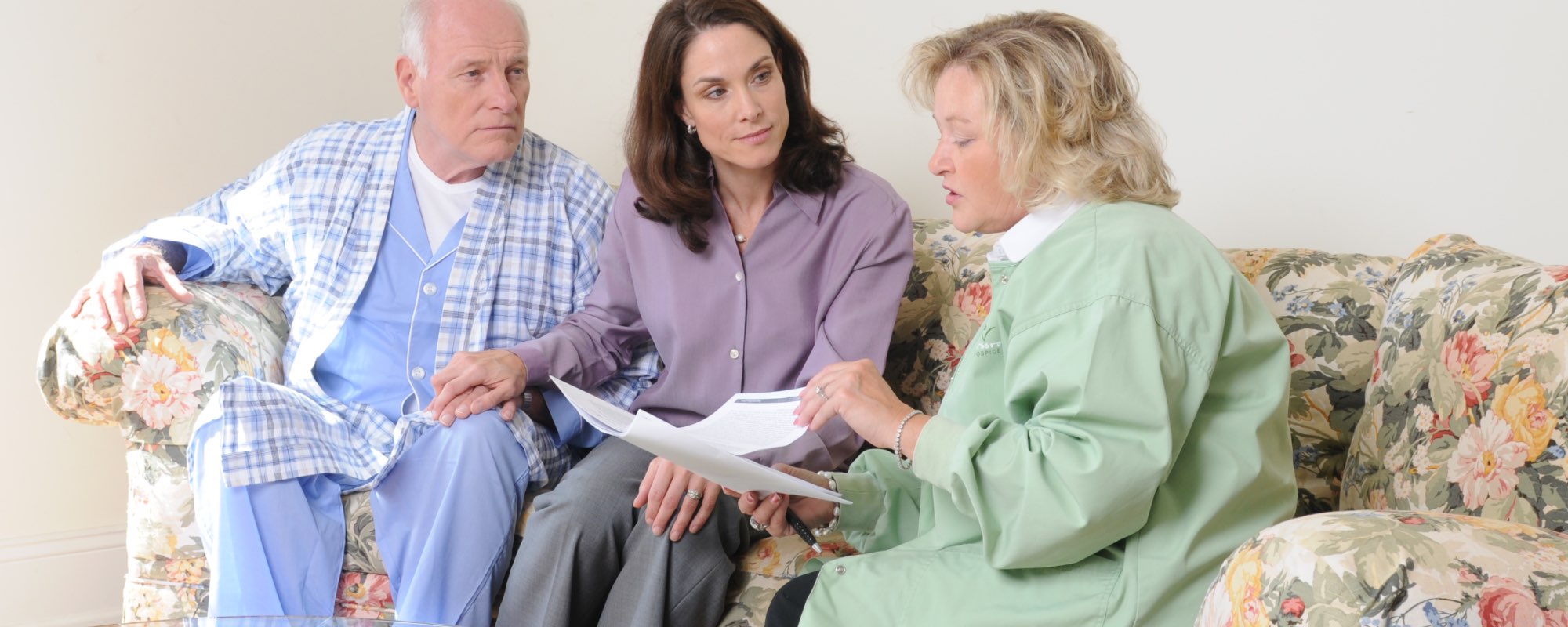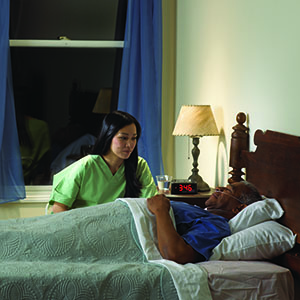
When is Hospice Recommended? Signs it’s Time to Call Hospice
No one wants to think about losing someone they love, which is why many families delay discussing end-of-life care. But services such as hospice can actually benefit everyone involved.
If you’re wondering when to call hospice, there's a good chance your loved one may already be eligible for this uniquely specialized care and support. Even if your loved one is not currently eligible for hospice care, gathering information ahead of time allows you to understand your options and make the best decisions for your family before a crisis hits.
13 signs it’s time for hospice.
Hospice may be recommended You should call hospice if your loved one is experiencing any of the symptoms below:when your loved one is showing any of the following signs:
- Frequent visits to the ER or hospital admissions: Recurring trips to the hospital indicate that traditional treatments may no longer be effective, and the patient’s condition is becoming more complex.
- A decline in their ability to perform daily tasks: If your loved one struggles with basic activities like including eating, getting dressed, walking, or using the bathroom, it may signal a significant decline in health.
- An increase in falls: Frequent falls can be a sign of weakened strength and coordination, which often occurs as the body starts to shut down.
- Changes to their mental abilities: Confusion, forgetfulness, or other cognitive changes can indicate that your loved one’s condition is worsening.
- Progressive weight loss: Unintentional and continuous weight loss is often a sign of declining health, where the body can no longer absorb or use nutrients effectively.
- Skin tears: Skin tears, bruising, and other signs of fragility can show that the body is becoming weaker and more delicate, which may indicate a decline in overall health.
- Frequent infections: Frequent infections can indicate that the immune system is no longer able to cope, making the body more vulnerable to complications.
- Increased or uncontrolled pain: If pain is becoming more severe or difficult to control, hospice care can provide more specialized pain management to ensure comfort.
- Loss of urinary or bowel control: Changes in bodily functions are common as the body begins to shut down.
- Chest congestion and/or rapid breathing: Labored breathing, congestion, and changes in respiratory patterns can indicate that the body is struggling to maintain normal functions.
- Changes in body temperature: Variations in body temperature, such as cold extremities or sudden spikes, can be signs of advanced illness.
- Restlessness or repetitive motions: Unsettled behavior, restlessness, or repeated actions can be symptoms of physical discomfort or anxiety as a person approaches the end of life.
- Treatment is no longer working: When a loved one’s health continues to decline despite treatment, it may be time to shift focus from curative care to comfort care.
If you are noticing these signs and wondering when to call hospice, it may be time now. Consider taking a brief quiz to determine if hospice care is the right step. When a loved one has a terminal illness, every moment counts. Speaking with a hospice professional early ensures your questions are answered and care plans are set before a crisis occurs.
Consider that hospice is not giving up. Rather, it is ensuring the best possible quality of life at the end of life, for everyone involved.

How to access hospice care.
To access hospice care, your loved one must be diagnosed by a physician of having a terminal illness with a prognosis of six months of less to live if the illness follows its typical path. If your loved one lives beyond this six month period, they can continue to receive hospice care if a physician re-certifies their eligibility. If your loved one’s condition improves while on hospice care or if they elect to pursue curative treatments over comfort care, they may discontinue hospice care at any time and pursue other options. Your loved one may resume hospice care later if their condition declines.
Why starting hospice sooner can improve quality of life.
 Families often wait to call hospice until the final days and weeks of their loved one’s life, not realizing they could have started receiving specialized nursing care, medications, medical equipment, and supplies related to their loved one’s terminal illness much earlier – and at no cost. Starting hospice care sooner improves the patient’s quality of life by managing pain and other symptoms, and provides families and caregivers with a support network they can rely on during this difficult time.
Families often wait to call hospice until the final days and weeks of their loved one’s life, not realizing they could have started receiving specialized nursing care, medications, medical equipment, and supplies related to their loved one’s terminal illness much earlier – and at no cost. Starting hospice care sooner improves the patient’s quality of life by managing pain and other symptoms, and provides families and caregivers with a support network they can rely on during this difficult time.
If you believe your loved one may need hospice care now or soon, it’s important to speak with a hospice professional as soon as possible. Many caregivers don’t realize that their loved one may already be eligible for the benefits and support hospice provides. Since it can be challenging to determine eligibility, consulting with a hospice professional when your loved one is experiencing a decline or has been diagnosed with a life-limiting illness can help you prepare and plan.
What can hospice do for my loved one?
Hospice provides an extra layer of care and support, ensuring that patients and families receive comprehensive physical, emotional, and spiritual assistance during this challenging time. A team of highly trained professionals, including nurses, aides, social workers, chaplains, volunteers and bereavement specialists, work together to address all aspects of care.
In addition to this dedicated team, hospice covers all medication and medical equipment related to the patient’s terminal illness provided at no cost. Hospice care is 100% covered by Medicare, Medicaid, and most private insurance companies. Hospice care can be provided in the comfort of your loved one’s home or at a care facility, working closely with families and physicians to ensure the best quality of care.
If needed and approved, hospice professionals also offer respite care, giving caregivers a much-needed break. This allows them to rest, recharge, and focus on spending quality time with their loved one.
Starting the conversation about hospice care.
 Discussing end-of-life care is never easy, but it’s one of the most important conversations you can have. Ideally, these conversations should begin long before a crisis arises, and even before you consider if it’s time for hospice. Often, the hardest part is just getting started. Once you begin, you may find your loved one is actually happy to express what is important to them.
Discussing end-of-life care is never easy, but it’s one of the most important conversations you can have. Ideally, these conversations should begin long before a crisis arises, and even before you consider if it’s time for hospice. Often, the hardest part is just getting started. Once you begin, you may find your loved one is actually happy to express what is important to them.
Use simple conversation starters to talk about end-of-life wishes, such as sharing your own preferences and asking your loved one about theirs. Situations like a health scare, serious diagnosis, or repeated hospitalizations can serve as prompts to start discussing hospice care options.
The Conversation Project offers a complimentary “Conversation Starter Guide” to help begin these conversations which can be wide ranging, covering topics such as who should be making decisions when the person is no longer able, what types of life sustaining treatment is preferred in various circumstances, whether someone prefers burial or cremation, or even what music should be played at the funeral.
Hospice care from Crossroads.
 Crossroads Hospice & Palliative Care provides comprehensive support for patients and their families. Our care team includes nurses and aides who assist with clinical and personal care needs, as well as social workers who help families access additional resources and guide them through end-of-life planning. Chaplains provide spiritual support, while volunteers offer companionship, giving family members a chance to rest. For those who need extra assistance, bereavement counselors are available to provide emotional support.
Crossroads Hospice & Palliative Care provides comprehensive support for patients and their families. Our care team includes nurses and aides who assist with clinical and personal care needs, as well as social workers who help families access additional resources and guide them through end-of-life planning. Chaplains provide spiritual support, while volunteers offer companionship, giving family members a chance to rest. For those who need extra assistance, bereavement counselors are available to provide emotional support.
Our team of pain management experts focuses on controlling discomfort efficiently, and we collaborate closely with your loved one’s physician to address any other issues, such as trouble sleeping or mobility challenges. Crossroads Hospice & Palliative Care also offers specialty programs designed to enhance your loved one’s quality of life, including the "Gift of a Day," where each patient gets to spend a perfect day doing something they love or have always wanted to try. Additionally, we honor veterans with a special recognition ceremony to thank them for their service, and patients can create Life Journals to preserve their stories and memories for future generations.
Crossroads is available 24 hours a day, 7 days a week, 365 days a year, to answer questions, provide support, and admit patients. Our team can meet with families at their home, in a hospital, at a care facility, or even at a nearby coffee shop—wherever is most convenient. We have locations in seven states across the country, and our team of experts is here to help you navigate this journey.
Contact us at 855-327-4677 at any time or reach out via the help bar above. Once a patient begins hospice service, the hospice care team will ensure that the patient has the medications, supplies, and equipment related to and necessary to treat the symptoms of the terminal illness. Care is typically provided wherever the patient resides, such as their home, a nursing home, or an assisted living facility.
